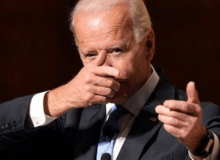This is the next installment in our series of contributions by a mysterious denizen of Mobile, Alabama, named “Felix Veritas.” I promise that I am not Felix and Felix is not I. In fact, there will surely be times when I disagree with Felix; I could take issue with a sentence or two in this, his second installment.
Felix is very thoughtful and a terrific auto-didact, with a great sense for “the big questions” of culture and politics. I am delighted to have his contributions to this site. Please be on the lookout for more, in the coming months. — Quin
=====================================================================================================
Good to be with you again. Last time we kicked off with a light, confectionary discourse….just whether American Society as we know it today can survive. Needless to say, a lot happened since then.
Since Quin’s readers are big boys and girls I figured we jump in with both feet. The answer: No doubt it can, but why do we feel like we’re on shaky ground? What’s missing now….what foundational community building blocks existed in the past that don’t today? Better yet, what are those building blocks?
What makes a country like ours work? What cultural gears have to mesh so the United States’ engine – a liberty-based representative republic — survives and thrives long-term?
I won’t make this a boring, academic exercise. But make no mistake, we’re seeing first-hand what happens without intellectual exertion, culturally and politically.
So here we go, understanding that political philosophers like John Locke, Montesquieu, Thomas Hobbes and Rousseau (among others) proposed various solutions for a free republic’s health. For them, societies were mathematical equations: take W, add X and Y, and you get Z. Pretty simple.
Right now, we’re short on some Xs and Ys. I’m obviously not in these guys’ class, but I think we can identify a few cracks creating instability in today’s American culture. Not an exhaustive list, mind you. But certainly a starting point.
Political Trust:
Revolutions – French, American, Bolshevik, Cuban — begin because citizens no longer believe the government works for the people. Poll after poll shows a growing portion of Americans don’t trust politicians and believe the political class serves itself more often than serving the citizens. The easy historical example is a dictatorship or monarchy like Gaddafi in Libya whom the people violently overthrow. However, Populist governments are just as corrupt. The Greek people see that, first-hand, as their officials’ false promises are coming home to roost. Worse, it remains to be seen if Greek “leaders” and their citizens employ financial responsibility to fix their problems, since financial responsibility is essentially exorcised from their political culture. Regardless, pending the European Union’s decision on the Greek debt, political upheaval in Greece is likely imminent, and trust is a primary factor.
Economic responsibility of poor and rich (Montesquieu):
Economic responsibility, as Montesquieu addressed it, is a 2-way street. In one direction, the concept of noblesse oblige — responsibility of privileged people to act with generosity and nobility toward those less privileged — isn’t new. Serving the lower economic classes doesn’t just fulfill moral and spiritual obligations, but is practical also. Economic benevolence toward the less-affluent masses promotes civil tranquility and fosters bottom-up trust, which you need if you’re outnumbered 50-1.
Correspondingly, Montesquieu argues the poor owe something as well. Exercising a diligent, industrious work ethic, he says, is the lower-class’s responsibility; along with that work-ethic, a vibrant, ambitious desire to climb the economic ladder is also a necessity. Work-ethic fueled by ambition creates a multiplied benefit when citizens succeed financially. It fertilizes previously-barren economic ground not only with capital but also with examples of hope for others.
Lastly, the poor are obligated to receive charity humbly without any sense of entitlement, but instead with a spirit of accountability to the benefactor. Failure to do so – receiving with an entitled attitude or wasting provided resources – damages top-down trust resulting in less charity, or charity with contingencies. Growing resentment from both sides also germinates here.
Thus the paradox of the Economic Responsibility Model: The wealthy give without any strings or obligations attached, while the poor receive in a spirit of responsibility/accountability to not frivolously use what was provided. Failure on either part creates social instability. Today, instability grows because a Grievance Industry — led by leftists like Al Sharpton – fosters entitlement and resentment among low-income wards. That festering discord enriches instigators like Sharpton personally, but obviously undermines the peace in communities.
Social Contract (Hobbes and Rousseau):
Within the “Social Contract” free people willingly give up some of their rights in exchange for the structure and protection offered by an organized community or society. However, when that “contract” is broken – or perceived to be broken – by enough citizens, disharmony erupts. This is another side of the Economic Responsibility model but extended to law-and-order, and many of the same tenets apply.
Without those valid ‘contractual’ concerns being addressed, ultimately overthrow takes place. The Social Contract theory also ties in with the Faith component we’ll discuss in a minute. America’s Constitutional framers understood the source of rights and specified such, because what God grants only God can remove, while if man provides rights then man can also take them away.
Virtue (Montesquieu and Locke):
This is touchy, especially these days.
Locke maintained that individual rights and individual value was top priority. But you hear a lot about “the good of the many (community) is more important than the good of the individual.” While that sounds warm and fuzzy initially, what happens if every individual’s rights are sacrificed for “community”? Then nobody has rights, except those enforcing the laws. So how are individual rights and community interest bridged? Virtue.
Again, this is touchy in today’s political climate. Defining ‘virtue’ means specifying “right” and “wrong,” “good” and “bad,” and “acceptable” and “unacceptable” behavior. Until recently, most Americans agreed to a traditional Judeo-Christian perspective; however, that may not be the case anymore.
For Locke and Montesquieu, much of “virtue” consisted of the Biblical principles (though not directly quoting Scripture) of loving one’s neighbor as yourself, serving others, diligent work-ethic, personal self-discipline and personal responsibility. Both scholars contended that in a liberty-based society – where you are free to live any way you pleased – promoting these spartan qualities provided necessary behavioral guard-rails (my word, not theirs). Without behavioral limits, everyone serves himself and his own appetite. Individual decadence – economic, corporate and personal – craters a society’s infrastructure, leading to ultimate demise.
In their ideal model the culture, not the legal authorities, maintains orderly behavior. Without that self-policing culture, government must oppressively enforce behavioral regulation and, by definition, erode personal liberty.
So how are cultural standards established and maintained over time? How do we maintain long-term benchmarks securing liberty and personal rights without succumbing to the whims of a given time-period? That leads to the next building block…
Faith and individual value/rights (Locke):
As previously stated, Locke said individual rights came from God, prioritizing the individual over the State. Thus, only God could take rights away, and that wasn’t happening any time soon. The American Founders understood this, hence them including “the Laws of Nature and of Nature’s God,” “endowed by their Creator with certain inalienable rights,” and “with a firm reliance on the protection of divine Providence” in the Declaration of Independence.
Faith is the key to unwavering behavioral standards, providing society’s guard-rails, if you will. Faith – in America’s case, the Christian faith — established, unequivocally, what is acceptable and what isn’t. Charity, love for fellow man, selfless service, respect for others, diligence, personal responsibility, hope for the future, and an ultimate eternal accounting for one’s adherence or lack thereof….the Christian faith encompassed it all. Since it was the faith embraced by most of the Framers, most certainly it was the tradition they – and Locke — envisioned.
Faith communities – primarily Muslim — exist the world-over, but aren’t necessarily cultures we embrace. As they show, a strong faith presence doesn’t guarantee personal liberty and individual value. To this point in history, few examples exist of overt Muslim communities fostering the free exercise of rights among all its citizens.
Sustaining a culture and country like the United Sgtates isn’t easy. On the other hand, being a peasant or a dictator’s subject…that’s a breeze. Just do what you’re told, and if the rules change we’ll let you know.
But maintaining a free society where rights are protected and opportunity is encouraged to all? Not so much.
Folks have to understand how this machine properly works, and that consequences absolutely await the entire society when those principles are ignored.
That’s where we are today. We’re currently reaping some consequences, and more are coming if we don’t wake up and right the ship. Here’s hoping we do.
— Felix Veritas






